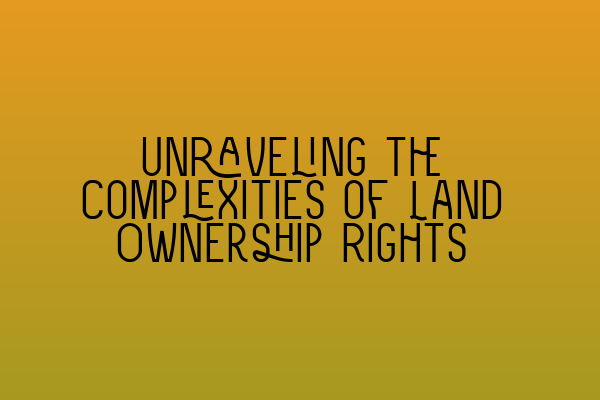Unraveling the Complexities of Land Ownership Rights
As a solicitor specializing in property law and land law, I often come across clients who are perplexed by the complexities of land ownership rights. It’s no surprise, really, as the legal framework surrounding land ownership can be intricate and confusing. In this blog post, I aim to shed some light on this subject and help you navigate through the maze of land ownership rights.
Before we dive into the nitty-gritty details, let’s first understand what land ownership rights actually entail. In its simplest form, land ownership grants you the exclusive rights to possess, use, and transfer a parcel of land. These rights are protected by law and are crucial for individuals, businesses, and organizations to establish and maintain their ownership interests in land.
To comprehend land ownership rights fully, it’s important to understand the different types of ownership that exist. The most common forms of land ownership are freehold and leasehold. Freehold ownership gives you outright ownership of the land and any structures on it indefinitely. On the other hand, leasehold ownership grants you the right to occupy and use the land for a fixed period, typically through a lease agreement with the freeholder.
Within these broad categories, there can be numerous intricacies and restrictions on land ownership rights. These may include easements, covenants, and restrictions imposed by planning authorities or other parties with an interest in the land. Easements, for instance, are rights granted to others to use a portion of your land for specific purposes, such as the right of way or the right to lay utilities.
Navigating through these complexities requires a keen understanding of property law and a meticulous approach to ensuring all rights and obligations are properly recorded and understood. As a solicitor specializing in property law, my role is to guide clients through this process, ensuring that their land ownership rights are protected and that they are fully aware of any restrictions or obligations attached to their property.
It’s important to note that land ownership rights can also be affected by legislation and regulations that govern land use and development. This includes zoning laws, environmental regulations, and government policies. Staying up to date with these legal requirements is crucial to ensure compliance and avoid any potential legal pitfalls.
To further complicate matters, land ownership rights can also be subject to disputes and conflicts. Boundary disputes, rights of access conflicts, and disagreements over land usage are common issues that can arise between neighboring property owners. Resolving these disputes requires a combination of legal expertise, negotiation skills, and sometimes court intervention.
At SQE Property Law & Land Law, we understand the complexities surrounding land ownership rights and the importance of providing our clients with expert guidance and advice. Our team of experienced solicitors is well-versed in property law and can help you navigate through the maze of legal intricacies to ensure your land ownership rights are protected and your interests are safeguarded.
Whether you are buying, selling, or leasing land, understanding your rights and obligations is essential for making informed decisions. By consulting with a solicitor specializing in property law, you can ensure that any potential risks are identified and mitigated, and that all necessary documentation is in place to protect your interests.
If you’re studying for the SQE (Solicitors Qualifying Examination) and need additional resources and practice exams, I recommend checking out our related articles on SQE 1 Practice Exam Questions and SQE 1 Practice Mocks FLK1 FLK2. These resources can help you prepare for the exam and gain a deeper understanding of property law and land ownership rights.
In conclusion, land ownership rights can be complex and challenging to navigate. Understanding the different types of ownership, the potential restrictions and obligations, and the ever-changing legal landscape is crucial for anyone involved in land ownership transactions. By seeking professional advice from a skilled property solicitor, you can ensure that your land ownership rights are protected and your interests are safeguarded.
If you would like to learn more about SQE 1 and SQE 2 preparation courses or check the upcoming SRA SQE exam dates, please visit our website for more information.
Disclaimer: The information provided in this blog post is for general informational purposes only and should not be construed as legal advice. Consult with a qualified solicitor for advice tailored to your specific situation.
